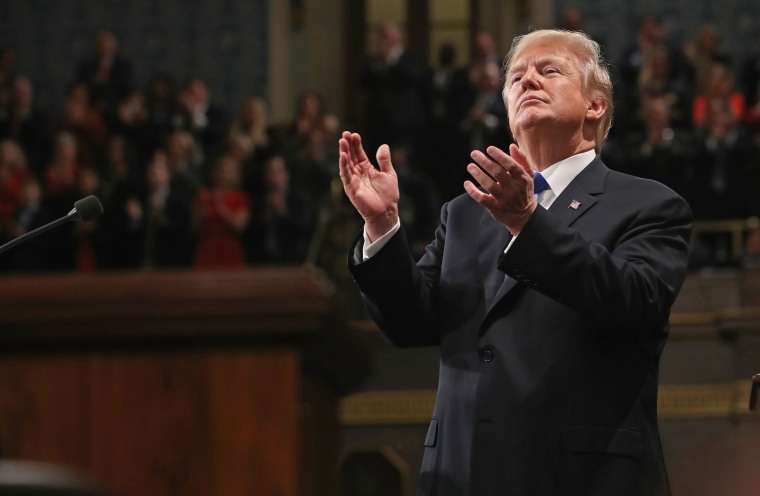What are the odds that President Trump, when he finally makes it to the podium in the U.S. Capitol tonight, will give us anything that lasts longer than a single news cycle?
State of the Union speeches are, as most Americans know, usually boring and predictable events, anticipated far more than they are remembered. So the odds are stacked against this president saying anything that historians will later cite.
But, occasionally, presidents have used them as an opportunity to state things of lasting importance. For instance, President Monroe announced the doctrine that bears his name in his written state of the union; George W. Bush introduced Americans to “the Axis of Evil;” and Franklin Roosevelt proclaimed “the four freedoms.”
Make no mistake, Donald Trump as a political communicator has real talent: No one is better at inventing insults or selecting slogans. Everyone remembers "Lock Her Up," "Build the Wall" and "Drain the Swamp." Chants at rallies aren’t easily converted into public policy — the one about the Wall has proved particularly thorny for the president and resulted in a month-long government shutdown — but good bumper sticker language helps candidates the way that clever ad copy sells soap. (Trump has always been a good salesman.)
Moreover, Trump communicates directly with the American people in his own words more often than other presidents. He tweets in bed, riffs at rallies and rambles at unscheduled press encounters. Trump shares his thoughts, whatever they may be, on a regular basis, which is unusual in presidential communication.
Most presidents hide some of what they think about controversial subjects. Jimmy Carter and George H. W. Bush, for instance, kept White House diaries with candid commentary that no one read until after they left office. Harry Truman wrote angry letters to his critics that were rarely mailed; his honest opinions were mostly filed in the bottom drawer of his desk and seen years later. Richard Nixon ranted and raged behind closed doors (and on tape) while in the White House. But the only people who could have known about those presidential words when they were spoken were the secret taping system technicians, and the political cronies who met with the president while he was ranting.
Trump’s thoughts and words, however, are more readily available to the American public.
There is, however, a caveat to his candor: A large number of his tweets and public pronouncements are demonstrably false. He often tells lies or makes unsubstantiated statements, then repeats them in the apparent hope that repetition will take the place of evidence. This means that, when we learn what Trump thinks, we often are presented with information that is simply not true.
There’s an old — and probably unfair — political joke: “How do you know when a politician is lying? You can see that his lips are moving.” That joke hits close to home for Trump, except that he also lies when his thumbs are moving.
Both Trump’s tweets and his troubles with the truth are norm-shattering presidential behaviors, which is absolutely related to his norm-shattering extemporaneous speaking style. The norm in presidential communication (until now) has been control. Prepared remarks are just that: Prepared, and normally not by the president's own hand.
A Washington wit once observed that it took half a day to get the President George H.W. Bush ready to make an off-the-cuff remark. In truth, though, every recent administration has had established procedures and professional assistants to craft political messages.
Ronald Reagan, the great communicator, had talented senior advisers and a highly skilled staff to draft speeches, manage press relations and plan favorable photo opportunities. Reagan participated in all of these activities because he understood that the president's words (and pictures) matter.
In the Trump administration, there is very little orchestration of presidential speech and many of the president’s public appearances are unplanned. Trump’s style of communication, once praised as authentic, increasingly comes across as incoherent and incompetent. After two years in the White House, there are no notable Trump quotes longer than a rally chant; there is no readily identifiable Trump doctrine.
News reports have speculated that the president will make an important announcement about border security in tonight’s address. But don't count on the idea that he, and his speechwriters, will use the wall (or some other topic) as the subject for a few eloquent sentences intended to be repeated and remembered, let alone change minds.
Instead, imagine an elementary school on a President’s Day in the not too distant future. The little Lincolns will recite the Gettysburg Address. The young John F. Kennedys will ask not what their country can do for them. The would-be Reagans will challenge the “evil empire” and ask Gorbachev to tear down the Berlin Wall. What will the Trump tots do? The best guess, at this point, is that they will stand in front of the class, tell the teacher where women should can be grabbed if you're famous, and scream “WITCH HUNT” and “NO COLLUSION” in loud capital letter voices.




